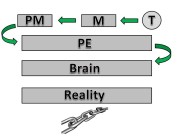Many times over the years, I have heard clients tell me, “While I was driving here, I thought, ‘what am I going to talk about?’” Often, we are able to find something to focus on but I wonder how useful these appointments are. Sometimes we end up discussing issues that we have covered previously and there is a feeling of dragging out the appointment just to fill the time. This is difficult for both of us. With that in mind, I thought I would offer some suggestions as to how to get the most out of your appointment and counselling in general.
1. Schedule It at the Right Time
Counselling appointments are not your average conversation. As such, it might not be a good idea to try to fit a session in over lunchtime. It is generally a good idea to try to avoid, if possible, scheduling other activities immediately following the appointment. Even if someone is slightly late for their appointment, my preference is for them to sit in the waiting room for a few minutes to gather themselves and their thoughts together before beginning. When we are feeling rushed, stress hormones interfere with our learning, on a cellular level. This means that we are not able to listen, concentrate and really internalize as well as we would like to.
When I was in my late teens, living at home and working full time with virtually no responsibilities, I made time to go to the gym every day for a couple of hours of lifting weights and playing full-court basketball. Since I usually did this six days a week, one would expect that I was in the best shape of my life. I would have been, except for one thing. McDonalds. During that same period of my life, I was eating at McDonalds as many as three times a day. Going to the gym and exercising intensely, only to stop at McDonalds on the way home to have a McChicken sandwich, cheeseburger, supersize fries with McChicken sauce on the side, and a large milk didn’t seem to be a winning combination. On the way home, I was basically undoing any benefit that could possibly be derived from my time at the gym.
The same thing can happen if a counselling appointment is sandwiched in between numerous other activities and demands. We need time following an appointment to digest the conversation and reflect on how to apply it during the time before our next session.
I realize that this is not always possible, and if it can’t be avoided, then you may have to come up with a workaround, but if you can be mindful about scheduling, not just looking for an hour-long window in your day, but possibly an hour and a half, you might find the session sticks with you longer
2. Bring Something to Talk About
As mentioned in the introduction, I often ask people if they have anything in particular that they want to discuss during the session only to be answered with a shrug of the shoulders. One way that some of my clients avoid this is to send me an email a few days before the appointment, listing a few things that they have been thinking about or dealing with in hopes of being able to discuss it during the session. This is a fantastic idea.
Even if you don’t get around to emailing the counsellor, or if that isn’t an option, writing out a list of things to talk about, possibly even in order of importance, is a great way to keep the session focused. Often sessions can wander, especially if both the therapist and the client have problems focusing, and while it may have been an interesting conversation, cclients may get home and realize that they didn’t actually get what they went there for in the first place. Even if the conversation is fcused, many times clients will email me following a session with a point or question that they meant to address in the session. Writing down a list ahead of time is a great way to avoid this.
3. Record the Session
Another common experience with clients is that they are very moved or affected by the conversation in one way or another but shortly after leaving the office, they struggle to remember exactly what it was that was talked about. Or if I gave them some advice or a piece of education that was helpful, they may have forgotten it. This is to be expected for a variety of reasons but the solution is actually very simply. Record the session. Some therapists record the sessions for themselves but for me, I prefer not to because I imagine some clients will be less willing to discuss certain issues if they know they are being recorded. However, if you are comfortable, I highly recommend bringing some sort of recording device to your session.
Sometimes, people bring a notepad or some paper to take notes, which is a good idea, but often it gets neglected, laying lonely on the couch beside them, and they end up leaving with a blank page. I try to make my sessions as naturally conversational as possibly and note-taking is not normally a part of a conversation so it can feel intrusive to a client to pull out the pen and paper to write things down. I don’t mind it, but it often doesn’t even cross the client’s mind until it is too late. Recording the conversation with your phone or some other device allows you to relax and act naturally.
4. Ask For Homework
People go to counselling for many reasons. Sometimes they want to learn something, sometimes they want some advice or reassurance, and sometimes they just want someone to listen to them talk. Regardless of what your purpose is in seeking counselling, it is a good idea to ask towards the end of the session if there is anything practical that you can work on in between sessions. I am reluctant to call this homework because of the negative connotations of such a word for so many people, but even an assignment to pay more attention to how often you say negative things about yourself, is something practical and constructive.
I can give tasks or assignments as involved or uninvolved as the client likes but I like for the client to initiate it if possible, rather than handing down the assignment like a teacher who will be grading your performance. Some clients fill out mood journals, complete checklists, count certain kinds of thoughts, write out experiences from their past or present, or any host of practical applied tasks.
Homework assignments are a great way to stay connected with the concepts that you are focusing on during the time between sessions. In fact, there is much therapy research that indicates that the time between sessions is much more predictive of therapy success than what actually occurs in the session. I imagine this is especially true when assignments keep the client engaged in the change process while away from the counsellor’s office.
5. Report On Your Homework
If you have been given and accepted a homework task, report on it during your next session or in an email to the counsellor between sessions. This creates a feedback loop to help you see if you are completely it correctly or if there are some changes that need to be made. One client that I worked with who was dealing with some traumatic events that had led to chronic panic attacks consistently reported that she was trying to do what we had talked about and trying to talk herself down from these attacks. I asked her, on a gut feeling, to demonstrate for me what this dialogue with herself sounded like and was surprised to see that she was missing a very key ingredient in the procedure.
I practiced a few times with her during the session and then asked her to send me a written account of the next time this happened during the week, which she did. This time, she was about 90% correct and I provided a little coaching. We then followed up during the following and subsequent sessions and began to see a marked improvement in length of these attacks.
In addition, it keeps the overall course of therapy on track. Sometimes therapy can seem a bit haphazard and jumping from one topic or issue to the next. Sometimes, this is OK and appropriate, depending on the circumstances. However, it is generally a good idea to have a defined goal for therapy. Following up on assignments allows you to align your sessions and tasks with that goal.
I hope that these practical suggestions assist you in your journey towards understanding. If you have any comments or questions, send me a message.


















































Recent Comments